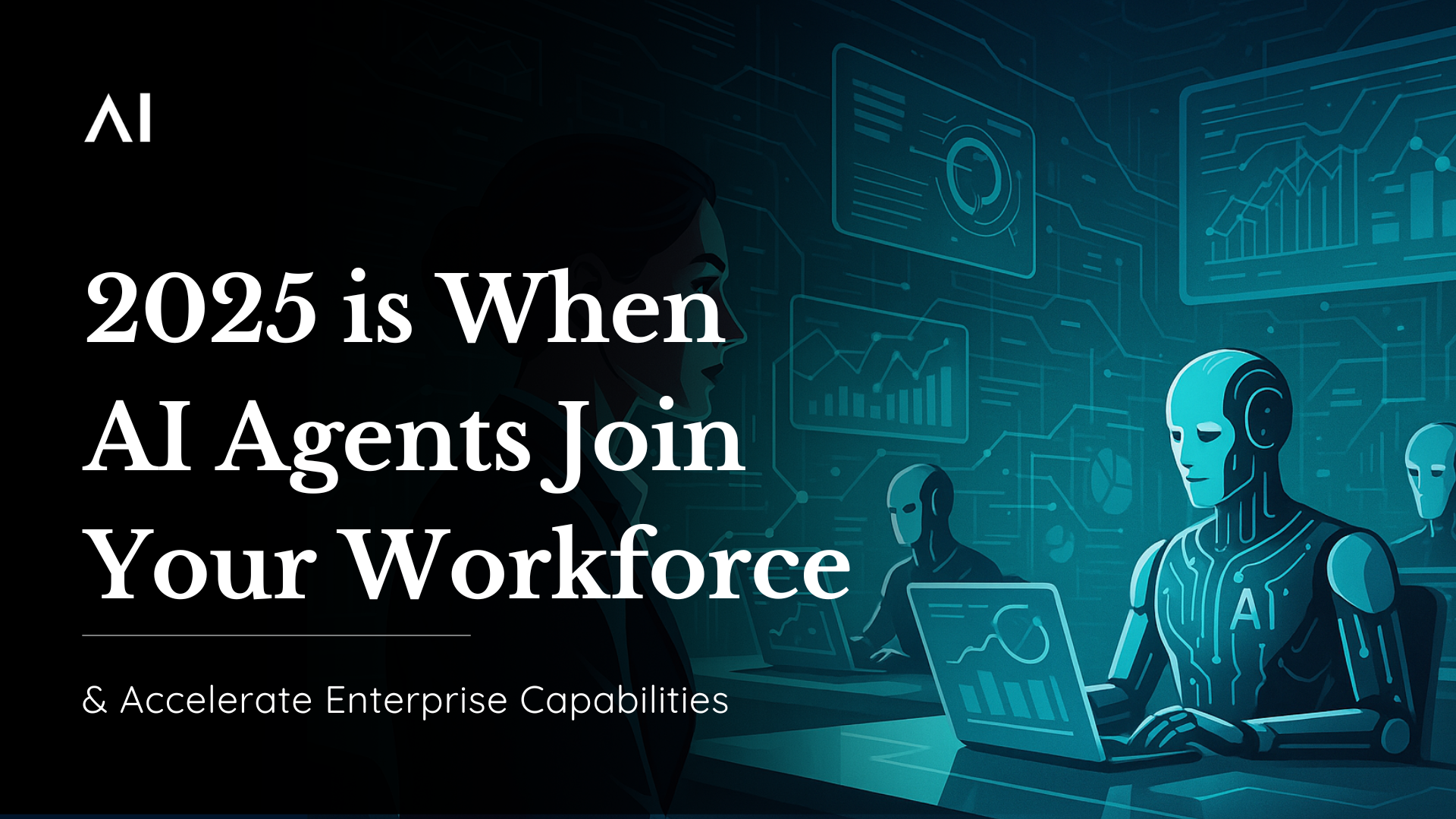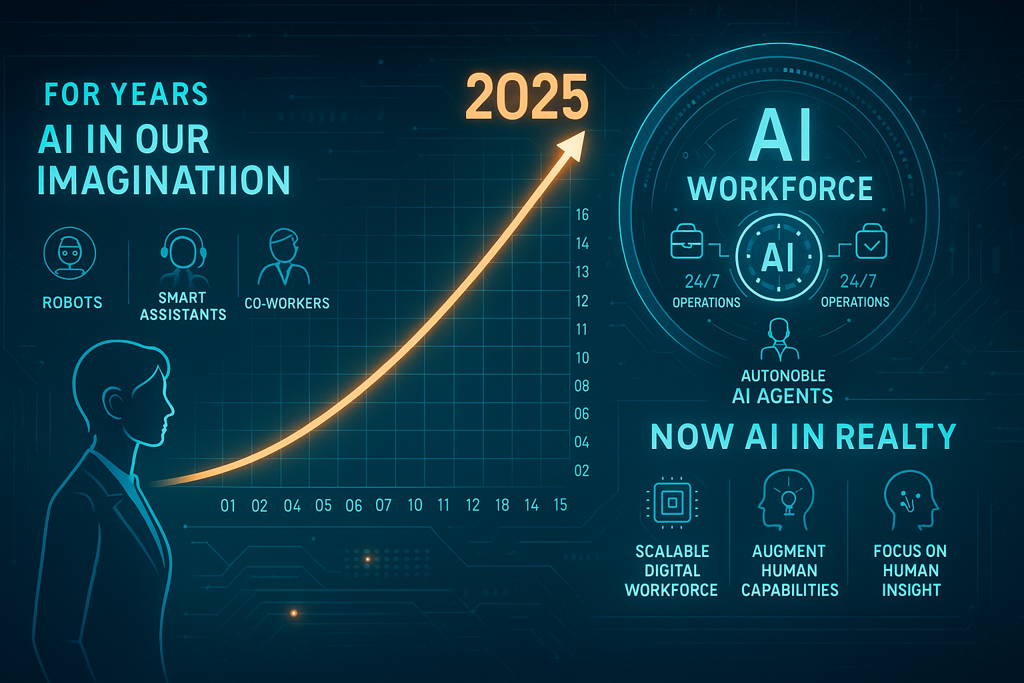Join our WhatsApp Community
AI-powered WhatsApp community for insights, support, and real-time collaboration.
In 2025, AI agents become core to enterprises — boosting efficiency, scaling operations, and freeing humans for strategy, creativity, and leadership.

| Why is AI important in the banking sector? | The shift from traditional in-person banking to online and mobile platforms has increased customer demand for instant, personalized service. |
| AI Virtual Assistants in Focus: | Banks are investing in AI-driven virtual assistants to create hyper-personalised, real-time solutions that improve customer experiences. |
| What is the top challenge of using AI in banking? | Inefficiencies like higher Average Handling Time (AHT), lack of real-time data, and limited personalization hinder existing customer service strategies. |
| Limits of Traditional Automation: | Automated systems need more nuanced queries, making them less effective for high-value customers with complex needs. |
| What are the benefits of AI chatbots in Banking? | AI virtual assistants enhance efficiency, reduce operational costs, and empower CSRs by handling repetitive tasks and offering personalized interactions. |
| Future Outlook of AI-enabled Virtual Assistants: | AI will transform the role of CSRs into more strategic, relationship-focused positions while continuing to elevate the customer experience in banking. |
For years, AI lived in our imagination — helpful robots, smart assistants, futuristic co-workers. In 2025, that vision takes a sharp step toward reality.
Except the "robots" won’t be humanoid figures walking the office floor. They’ll be autonomous AI agents, quietly embedded in systems, working 24/7, and handling workloads once split among multiple human teams.
This shift is not about replacing human ingenuity — it’s about deploying AI as a scalable digital workforce that augments human capabilities. The more tasks we offload to AI agents, the more humans can focus on the uniquely human: critical thinking, leadership, empathy, and creative problem-solving.
For a step-by-step blueprint on deploying agentic AI across the enterprise, check out our Enterprise Agentic AI Playbook.
Until recently, AI agents were seen primarily as digital assistants — capable of scheduling meetings, retrieving data, or automating repetitive tasks. Useful, yes, but hardly transformative.
2025 marks a shift. AI agents are no longer confined to the role of “helpers.” They are evolving into strategic collaborators that can proactively identify opportunities, anticipate problems, and recommend solutions based on real-time data.
For example, in enterprise operations, agentic AI can autonomously:
This leap from execution to strategic insight is possible because of advancements in multi-agent collaboration, contextual reasoning, and real-time integration with enterprise systems. Rather than simply waiting for instructions, these AI agents initiate actions aligned with company goals — much like a high-performing team member.
If you want to see how this works in action for customer service, we explored it in How AI Agents Resolve Customer Issues Without CRM Queues.
The tech has existed for a while, but three converging trends make 2025 the tipping point:
According to Gartner’s 2025 Emerging Tech Impact Radar, over 60% of enterprises will have at least one department where AI agents handle more operational tasks than human staff.

One of the most misunderstood narratives around AI agents is the "replacement fear."
Here’s the reality: AI will not take your job, but it will take over the tasks that slow you down.
Think about it:
McKinsey’s 2024 State of AI Report notes that 40% of repetitive, rule-based tasks across knowledge work can be automated without reducing human headcount — and in many cases, businesses redeploy these humans into higher-value strategic roles.
For an example of this reallocation in HR, read our deep dive on Rebuilding HR with AI.
By mid-2025, a typical AI-first enterprise team could look like this:
In this setup, humans and AI agents form blended teams, where the digital workforce handles execution at speed and scale, while humans guide the “why” and “what next.”
These are not pilot-stage experiments anymore — these are measurable, profitable outcomes in live businesses.
.webp)
Risk assessment, compliance checks, and fraud monitoring are ideal for tireless AI agents. Banks like JPMorgan already have multi-agent fraud detection teams running alongside human analysts.
AI diagnostic agents assist doctors by reviewing scans, medical histories, and treatment options — speeding up care delivery while doctors focus on patient interaction.
AI routing agents can coordinate hundreds of shipments in real-time, adjusting for delays, costs, and environmental factors — tasks that would overwhelm a human dispatch team.
Content ideation, A/B testing creative campaigns, and even pre-editing video drafts are increasingly handled by AI agents, freeing creatives for high-level storytelling.
Hiring more humans means onboarding, benefits, HR processes, and management bandwidth. AI agents sidestep these bottlenecks:
This is why AI adoption 2025 will focus less on "Can this tech work?" and more on "Where can we place our next AI hire?"
To see how AI’s ROI is evolving, check out Stop Measuring Enterprise AI Like It’s 2020.
A single AI agent can be impressive. But multi-agent systems — where multiple AI agents communicate and solve problems together — are the next big leap.
For example:
All before the human marketing director starts the day. This isn't just productivity — it’s compounding intelligence.
Beyond efficiency, AI agents bring precision in compliance.
They can monitor regulatory changes in real-time, flag potential risks, and auto-adjust workflows to remain compliant — something humans often struggle to do at scale.
For heavily regulated industries like finance, healthcare, and manufacturing, this means reduced legal exposure and faster audit readiness.
Here’s the paradox: the more AI agents we add, the more critical human leadership becomes.
AI can execute brilliantly, but it still needs human oversight for:
Think of AI agents as high-performance engines. The human remains the driver — setting the destination, adjusting to the road, and deciding when to accelerate or brake.
To prepare for a workforce where AI agents might outnumber humans in task execution, you should:
The idea of an AI workforce used to feel like distant science fiction. In 2025, it’s operational reality.
Not in a threatening, job-replacing way — but in a liberating, efficiency-unlocking way.
If the last decade was about AI as a tool, this decade is about AI as a teammate.
And by the end of 2025, many enterprises will look around their “office” and realize something remarkable:
The most productive members of their team never sleep, never miss a deadline, and are always ready to collaborate — because they’re AI agents working with them, not instead of them.
Fluid AI is an AI company based in Mumbai. We help organizations kickstart their AI journey. If you’re seeking a solution for your organization to enhance customer support, boost employee productivity and make the most of your organization’s data, look no further.
Take the first step on this exciting journey by booking a Free Discovery Call with us today and let us help you make your organization future-ready and unlock the full potential of AI for your organization.

AI-powered WhatsApp community for insights, support, and real-time collaboration.
.webp)
.webp)

Join leading businesses using the
Agentic AI Platform to drive efficiency, innovation, and growth.
AI-powered WhatsApp community for insights, support, and real-time collaboration.